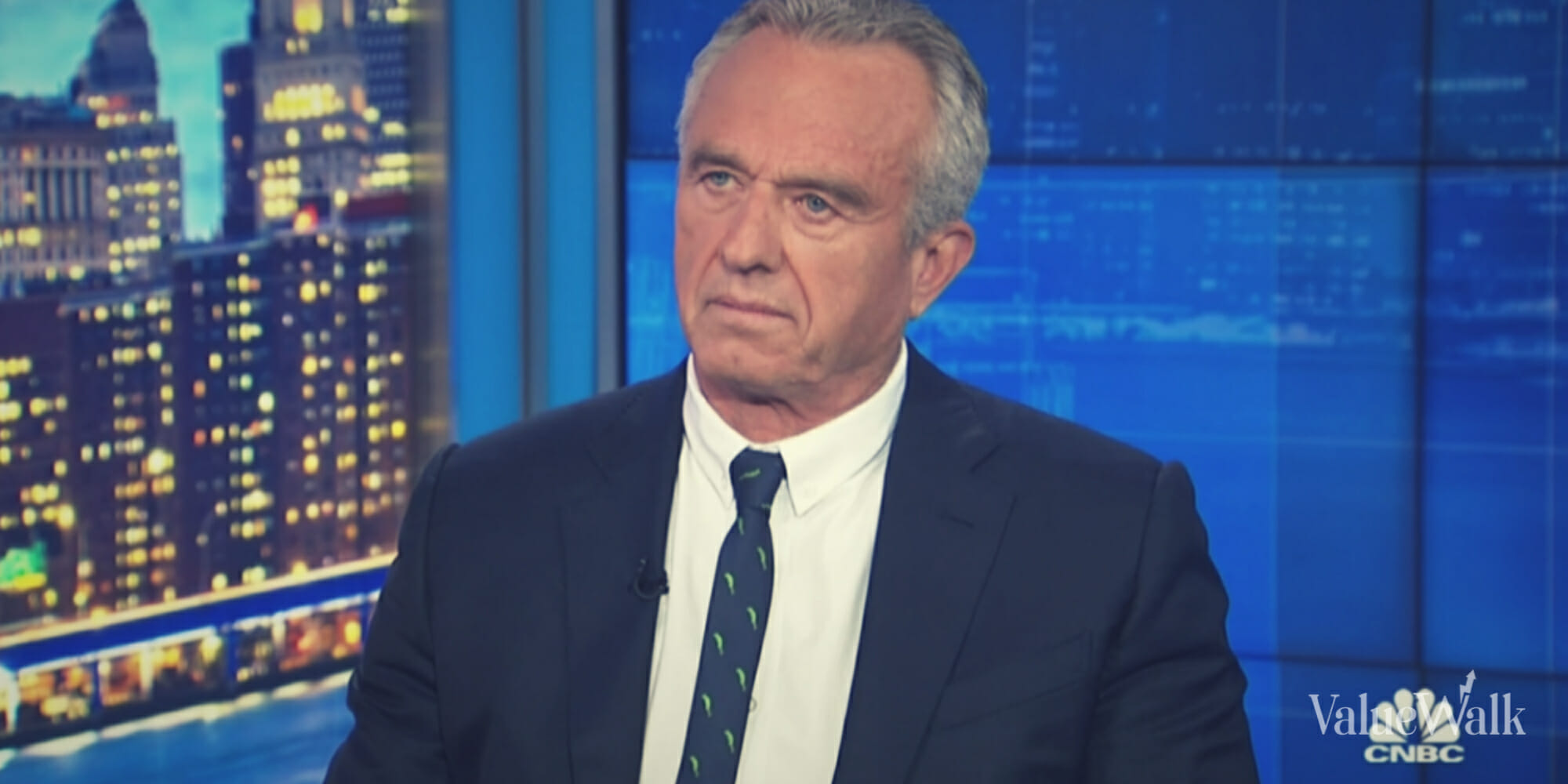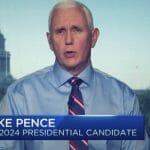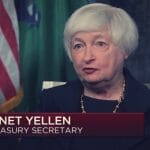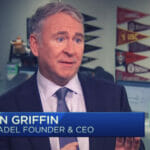Following is the unofficial transcript of a CNBC interview with Democratic Presidential Candidate Robert F. Kennedy Jr. on CNBC’s “Last Call” (M-F, 7PM-8PM ET) today, Wednesday, August 30. Following is a link to video of the full interview on CNBC.com.
Interview With Democratic Presidential Nominee Robert F. Kennedy Jr.
Part I
BRIAN SULLIVAN: Welcome back to “Last Call.” Time now for our extended sit down with Democratic presidential candidate Robert F. Kennedy Jr. Obviously a lot to cover. But we did this interview like we do all interviews thinking about you, our CNBC audience, so we stayed away from some of the questions Kennedy seems to get all the time. And we began by asking him to finish this sentence. The American economy right now is what?
ROBERT F. KENNEDY JR.: In trouble.
SULLIVAN: Why? A lot of the economic data is good. Consumer spending is good.
KENNEDY: Yeah, I’m aware and we’re $33 trillion in debt and we have two presidential candidates who are saying they brought prosperity to this country, but you’ve got 57% of the American people who cannot put their hands on $1,000 if they have an emergency. And for those people, the engine light goes on in their car and it’s like the apocalypse happened. It’s the end of the world for them. We have now kids can’t afford houses.
Housing prices have gone from $215,000 2 years ago to 400,000 today. You know, I have seven kids who are in the range of 20 to 35 and almost none of their friends are buying houses. Now, part of the American Dream that if you worked hard, you played by the rules, you can afford a house. You can take a summer vacation, you could put money, you can raise a family, put money aside for retirement and that was with one job and that’s not happening.
SULLIVAN: Yeah, now I think it’s about, I think you tweeted about this about half the country the median income is below—
KENNEDY: Is $5,000—
SULLIVAN: Less than the cost of living.
KENNEDY: Right.
SULLIVAN: So you basically have to have two jobs.
KENNEDY: You have to have two jobs and you, and that’s—
SULLIVAN: But how do we do and you said your economic plan is going to fix that. How do we fix that because this seems structural over the years—
KENNEDY: It is structural.
SULLIVAN: Or decades even.
KENNEDY: Well, number one, we have to unravel the warfare business, the warfare machine that is bankrupting our country that and, you know, Paul Kennedy was the Yale historian that, has done this extraordinary history of the decline of empires. And every empire in the last 500 years its debt now is overextending its military abroad.
We’ve spent eight trillion dollars on wars over the past 20 years since 2002 that have gotten us nothing that have made it less safe to be an American, less our country less safe. The Chinese spent eight trillion dollars during that same period while we were bombing bridges, ports, roads, schools, universities, hospitals, they were building them and they’re now the principal creditor for almost every nation in Latin America and every country virtually every country in Africa.
SULLIVAN: So how would cutting the defense budget help the middle class?
KENNEDY: Well, in a number of different ways. I mean, first of all, we’re going to lower our deficits, we’re going to, we can bring a lot of that money home. I mean, if we hadn’t spent that 8 trillion, Brian, we could extend the life of solvency for Social Security loan for 30 years. We could pay for university educations for every child in America. We could pay off the credit card debt in our country for individuals. We could—
SULLIVAN: So take the DoD spending cuts, this is primary to your economic plan, transfer that money into other things.
KENNEDY: Yeah but I mean, that’s not the only thing I want to do. I have a number of direct programs for that, that are common sense programs that will begin restoring the middle class in this country in dramatic ways.
SULLIVAN: Okay, what’s another one?
KENNEDY: Well, one of them is to create one of the big problems, one of the reasons that the price of housing has gone up and nobody can get a house anymore, people make an offer on a house and then somebody comes in with a cash offer of—
SULLIVAN: A lot of these are big institutions by the way.
KENNEDY: They’re big—
SULLIVAN: Wall Street—
KENNEDY: They’re BlackRock, Vanguard, State Street.
SULLIVAN: Buying up hundreds of thousands of homes.
KENNEDY: Right. Their objective, now they own 88% of the S&P 500. Now they’re targeting single family homes. They’re competing with our kids, and they have these big bank books so the cost of money and mortgages to them is minuscule.
And our kids now I have to compete with them. And, you know, Thomas Jefferson said, American democracy has to be based on independent freehold ownership of independent freehold by tens of thousands of American citizens each with a stake in our system of government. We’re now moving back to a futile system where we have corporate—
SULLIVAN: Well, what do we do about it Mr. Kennedy? Do we—
KENNEDY: Well, let me give you—
SULLIVAN: Make it illegal for insert big Wall Street bank name here to buy up massive amounts of property?
KENNEDY: You change the tax code to make it more difficult for large corporations to accumulate thousands of houses but here’s a direct program. If you have a rich uncle who will cosign your mortgage, you can get a much lower rate because the bank’s basing it on his his credit rating rather than yours.
So I’m going to give everybody a rich uncle, which is Uncle Sam who will guarantee mortgages at, for single family first time single family home buyers at 3% interest. That will reduce the average price of mortgage by $1,000 a month. I will finance that not by increasing our debt, which I’m not going to do, but rather by selling tax free 3% bonds to finance it. That will allow, you know, we had—
SULLIVAN: I’m hearing shades of Fannie Mae and Freddie Mac in my head though. This is where and they run into their own problems, we’ve covered—
KENNEDY: Yeah. Well they—
SULLIVAN: How would your plan be different than what currently exists?
KENNEDY: Well, we have now surpluses in Fannie Mae and Freddie Mac. Oh, and, you know, that would be, I could tie those, those institutions into this program, but we need this program. We had, you know, we had 50 years of prosperity in this country after World War II, economists and social scientists call it the great prosperity.
SULLIVAN: Would you raise taxes on people making under 400,000 a year?
KENNEDY: No, I would not. I’m not going to raise taxes. I’m not going to raise taxes. I don’t think that that’s the right thing to do right now. I think we really need to stimulate our economy. Another thing that I’m going to do is to create is, and this is a program that we announced this week, and it’s a program that my uncle, Ted Kennedy, and John McCain originally advanced in 2007, and then it was advanced by a number of civil rights leaders, including Andrew Young and a number of others for a whole lot of reasons, a very good idea, to make passport, passport cards free.
So one of the, you know, one of the big penalties against being working poor in this country is that a lot of the working poor do not have a federal photo ID. And under the Patriot Act, the banks are, have all of these — that make them investigate your ID and they don’t want to handle the small accounts from poor people.
Part II
KENNEDY: The Inflation Reduction Act was hijacked by industry by particularly the carbon industry that, you know, carbon capture which is there’s $173 billion in subsidies in that act for carbon capture, we need free market capitalism. We need to end the subsidies to the carbon industry. Listen, right now, you can build a solar plant in this country, capital costs to build a solar plant are about a billion dollars in gigawatt. A coal plant is $3.6 billion dollars in gigawatt. So, and a nuc plant is 14 billion in gigawatt.
SULLIVAN: Yeah but nuc is always on.
KENNEDY: No, it isn’t. There is, there are—
SULLIVAN: But nuclear is always on.
KENNEDY: No. No, they have more maintenance outages in nuclear power plants than almost any other sector.
SULLIVAN: You do have maintenance. You have some water issues. I agree but for the most part, fusion—
KENNEDY: Well, but if it’s for. Listen, you can, you can—
SULLIVAN: Is the sun.
KENNEDY: Well, we don’t have fusion, okay?
SULLIVAN: Well, fission, fusion. You get my, I wish we did have cold fusion by the way. We could create limitless energy and there are some encouraging—
KENNEDY: Well, yeah, of course.
SULLIVAN: There are some encouraging little, you know, signed programs there.
KENNEDY: Yeah, but we don’t have that—
SULLIVAN: What is your view on nuclear power?
KENNEDY: My view is and I’m all for it if they ever make it safe and if they ever make it economic. You can make, we can make energy by burning prime rib. You know, why wouldn’t we take the cheapest form of energy, why wouldn’t we take the cheapest form of energy possible—
SULLIVAN: So what do we do? What’s the new energy economy then? Wind, solar, get rid of the subsidies for the carbon capture.
KENNEDY: Get rid of the subsidies and there’s $5.2 trillion in subsidies annually for carbon. There are small subsidies relatively small for wind and solar.
SULLIVAN: Where would U.S. oil and gas fall in the Kennedy administration, because you are an environmental guy as well, plan? And also do you have a view on OPEC?
KENNEDY: I mean the thing that we should be worried about right now is BRICS and BRICS is gonna own OPEC and that is because we’ve weaponized, you know, because of our war etiology has has driven the acceleration of BRICS and now you’ve got BRICS is representing I think 47% of the world’s population and 37% of GDP. But they, now with BRICS-11, you have Russia, Saudi Arabia, Venezuela, which control OPEC so 90% of the energy is going to be—
SULLIVAN: I think you might have read my mind since I have no notes which is that was my final or close to final question was was going be about China, okay? And particularly you’ve got the U.S. Commerce Secretary Gina Raimondo over there. But I want to get your views on China, but you talked about BRICS so for our viewers who aren’t familiar Brazil, Russia, India, China, plus South America or South Africa. They’re expanding, now they’re expanding their group dramatically.
KENNEDY: Right.
SULLIVAN: It feels like kind of a huge and we talked about it on my show last week—
KENNEDY: And it’s an alternative to the dollar as the—
SULLIVAN: Correct.
KENNEDY: World reserve currency.
SULLIVAN: What would you, what would a Kennedy administration do to counter that growing counterweight that clearly is being run mostly by China?
KENNEDY: Well, nobody wanted to start BRICS. Nobody wanted an alternative to the U.S. dollar. This happened because of our weaponization of the U.S. dollar and the weaponization of our foreign policy, unilateral weaponization and the weaponization of our control of the world currency. We were pounding people’s, you know, their personal assets if the government misbehaves and do it unilaterally.
So, we created we need to deescalate our, you know, our our violence around the world which has driven the creation of BRICS. And, you know, the answer to your question about China. China does not want a war with the United States. We spent three times on our on our military what they do. We have 800 bases abroad, they have one and a half. They’re not, look, they want to compete with us. They want to bury us but they want to do it on an economic playing field. And they need us. You know, they cannot survive without us.
SULLIVAN: We’re their, we’re their marketplace.
KENNEDY: Right. And I—
SULLIVAN: We are the biggest buyer of Chinese goods by far.
KENNEDY: Right, Walmart. So I’m not afraid of the United States competing with China head to head and countries around the world. I think that’s good for us. I think we win that competition because we have free—
SULLIVAN: What about U.S., Nike, Apple, U.S. companies doing business there? If you were going to give advice to Tim Cook of Apple, what would it be?
KENNEDY: Well, I, giving economic advice or, you know, patriotic advice?
SULLIVAN: No, about doing business in China.
KENNEDY: I don’t, I’m not somebody who thinks that we should divide the world. We live on one planet that we should divide the world into, you know, into different sectors. I think the shared markets are ultimately good for the world because they decrease the chance of war. And that ultimately is the greatest threat and I am not frightened about I think the U.S. policy should always be we should the government policy should be about fostering, developing, nurturing the middle class in this country and that’s what U.S. policy. I don’t think we should cut off trade with China. I think some of the things that are being done for example, you know, the programs to bring semiconductor—
SULLIVAN: The CHIPS Act.
KENNEDY: The CHIPS Act. I, you know, I don’t like the fact that we’re getting subsidies to the richest companies in the world but I do think it’s prudent to the M&M Bank semiconductors here in the United States and I’d like to see more of that, you know, trying to bring the industry to home. But I’m not, you know, I don’t I don’t think we should be rattling the sabers with China.
When you when you treat somebody as an adversary, they tend to become one. And we did the same thing with China and there are a group of people in the State Department White House who want constant pipeline of new wars to feed the military industrial complex—
SULLIVAN: Two final questions.
KENNEDY: And they shouldn’t be driving our foreign policy.
SULLIVAN: Two final questions Mr. Kennedy. Number one, this is a little bit out, on crypto, should we back 10% of U.S. government debt with cryptocurrency? I mean we’re off the gold standard 50 years now.
KENNEDY: Well, they, 10% you mean like—
SULLIVAN: Or a number.
KENNEDY: You mean selling T bills with that—
SULLIVAN: Backed by crypto—
KENNEDY: I, you know what—
SULLIVAN: Or any U.S. government obligation not backed by gold but by the new, the digital I guess the digital gold.
KENNEDY: I mean, right now, I like the idea of having some attachment to a base currency for to relieve some portion of the T bills out there. I think it enforces discipline and against, you know, just printing money endlessly so and that and that individuals and governments etc. when they buy T bills can get. You know, my uncle did this in 1963 with silver certificates and gold certificates. He tried to return at least an option for base currency rather than fiat currency which is, you know, which is, which has destroyed middle class in this country. It’s become—
SULLIVAN: I did not ask that question by accident, Mr. Kennedy. Final question and, you know, I’m going to, I leave, I leave the politics to a lot of the other people and also some other issues that you may be familiar with that I think you’ve asked a billion times but I want to end on on this note because I think it was yesterday or two days ago, there was an AP poll that showed that 77% of Americans felt that Mr. Biden, President Biden was too old to serve another term, including 69% of Democrats.
Now, whatever you may think of that, the Democratic National Committee has said that there will not be a primary debate which I understand historically, incumbents do not face primary challengers or debates, generally. I have a feeling I know what you’re gonna say but when make the case to the DNC for having a debate, one debate between you, any other candidate and President Biden in front of the American people to maybe assuage some concerns.
KENNEDY: Yeah, I mean, I think that’s the point that there’s a lot of misgivings now among a vast majority of Republicans, Democrats about the President’s capacity, his mental—
SULLIVAN: And again I want to be clear, this is not my comm–, this is not my thought. This is an AP poll, 69% of Democrats.
KENNEDY: Yeah so I think it’s important for the President to have to have a debate to show it’s a rigorous job to show that he has the vigor that he has the mental acuity and to put those misgivings aside with American people but not only a debate to have unscripted conversations with voters and to do some retail politics.
Now, you know, if he’s going to have to debate President Trump or whoever the Republican is at some point and to and, you know, to say that he should sit on a couch, now it’s like preparing for, you’re telling a prizefighter, you’re going to prepare for this, the prize flight, the championship by sitting on a couch and eating Chick-fil-A. You know, we should, you need to be practicing—
SULLIVAN: Sounds delicious by the way.
KENNEDY: You need to be practicing and, and you need, and getting on your feet and getting on your toes. And making sure that—
SULLIVAN: Are you talking to him about getting one? Is there any chance that there would be a debate?
KENNEDY: Well, we’re asking them for one. You know, I think the American people and even Democrats who don’t like me particularly because they were just because they don’t because they’re misled about what I believe about certain things. But, but even though virtually all Democrats want to see a debate.












